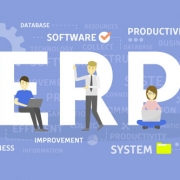Enterprise Resource Planning Technology Trends As We Move Toward 2025
NewsBusiness strategies are continuously realigned and adjusted based on influences and changes in technology. In enterprise resource planning (ERP), there are many advancements and changes each year. Kevin Beasley, Forbes Council Member and CIO at VAI, shares an article highlighting the emerging ERP trends to note as we enter 2025.
Industry-Specific Functionality. “An ERP system is no longer a one-size-fits-all solution. Food, healthcare and manufacturing are just a few examples of the industries that need specific solutions to address their unique challenges. Industry-specific ERP is necessary for the healthcare sector to manage patient data, ensure HIPAA compliance and simplify revenue cycle management. Inventory control and tracking are essential for food and beverage businesses to adhere to food safety laws. There are numerous moving parts in manufacturing since they must manage production, acquire supplies and complete orders. ERP serves as a single hub to link all these aspects of the company and thereby acts in service and betterment of whole industries.”
An Integration With The Internet of Things. “The Internet of Things (IoT) has many potential uses and is expected to become more significant in influencing our world as the number of devices linked to the internet rises by utilizing later technologies in existing 5G and future 6G telecommunications and changing the ways in which we work, live and communicate with one another.”
Powering Industrial ERP With AI. “AI is expected to see an annual growth rate of 36.6% from 2023 to 2030, and it is inevitable that AI and machine learning will be integrated deep into ERP systems as they develop. AI-driven ERP deployments will completely transform how companies run in 2025 and beyond. These technologies facilitate enhanced decision-making processes, advanced predictive analytics and the automation of repetitive jobs by integrating robotics. The massive volumes of data produced by ERP systems today require data scientist expertise and can take a long time to be analyzed. Using AI to analyze the data will yield insightful information that can enhance business results in dramatically reduced time.”
Cybersecurity. “The realization that security is essential to tech-driven success will push businesses to aggressively fortify their cybersecurity posture. Partnerships with managed service providers will be essential in navigating this environment to develop and sustain resilience against cyber risks, particularly as the application of AI in operations continues to advance. AI-driven cybersecurity solutions, able to anticipate and eliminate cyber threats before they have a chance to inflict damage, will become standard. Proactive defense mechanisms will become the focus, with AI constantly learning and adjusting to new threats.”
Cloud ERP. “Unlike traditional systems that are installed on on-premises servers and data centers, cloud ERP is provided online and shares power consumption, cooling requirements, security and operations functions with all the tenets of the cloud. This reduces each cloud tenet’s carbon footprint by sharing these resources. Businesses can adapt to their evolving needs thanks to their nearly unlimited scalability and anytime, anywhere access. Cloud ERP also reduces expenses by eliminating upfront hardware purchases and IT maintenance. Rather, these companies receive a reliable subscription service that maintains the security and modernity of the system. All things considered, cloud ERP is a major development in modern business management since it offers businesses a scalable, cost-effective and secure alternative.”



Leave a Reply
Want to join the discussion?Feel free to contribute!